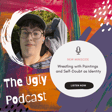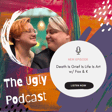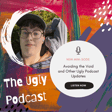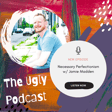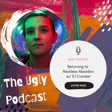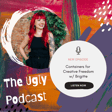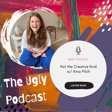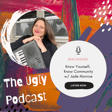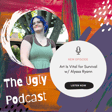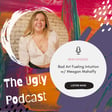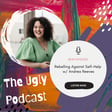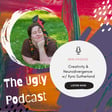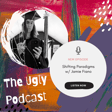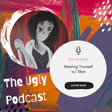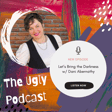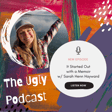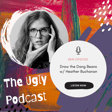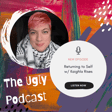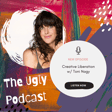Embracing Ugly Art and Dismissing the Inner Critic
00:00:04
Speaker
Welcome to The Ugly Podcast, the place where creatives are encouraged to make messy, ugly art and to redefine their relationship to their inner critic. Every other week, I am joined by creatives of all mediums and methods to discuss our creative processes and how we navigate the mental minefield of creativity. This podcast serves as a reminder that you and your art get to be whatever the hell you want to be, ugly and all.
00:00:32
Speaker
Hi, welcome back to The Ugly Podcast.
Meet Sabrina Estudio Butler: Nonfiction Book Coach
00:00:36
Speaker
I am Lauren Alexander, your host, They, Them, and I've got a great guest for you today.
00:00:43
Speaker
My guest is a writer first nonfiction book coach who helps BIPOC high achievers get organized and gain confidence so they can go from book idea to actual book without all of the overwhelm and self-doubt. She's on a mission to add more color to the bookshelves because publishing, as we know, is white as fuck. She's also a wife, a nerd, and a self-proclaimed professional nap taker. Welcome. Thanks for being here with me. Would you please introduce yourself with your name and your pronouns?
00:01:12
Speaker
Sure. Well, thank you for having me. My name is Sabrina Estudio Butler. My pronouns are she, her, hers. I never understood the reason for the third one, but she, her.
00:01:24
Speaker
Um, and yeah, I'm, I'm a nonfiction book coach. Everything you said, that's cool. Yeah. So thank you so much for coming on here.
Speaking Out on Diversity in Publishing
00:01:34
Speaker
I, so Sabrina posted, um, in her stories a couple of weeks ago and was like, I'm going to start saying the quiet part out loud and start calling out the publishing industry for being like too white and.
00:01:51
Speaker
I'm just tired of pandering and just not speaking out. I messaged her immediately and I'm just like, hey, do you want to come on my podcast and talk about that? I'm really glad that you agreed. Tell us all more about the transformation that you are finding yourself in with your business, personally. Sure.
From Architecture to Book Coaching
00:02:18
Speaker
my business transformation. So my business is called unpolished words. Unpolished words. Realized I didn't say that before. Um, I've been in business for a little over three years now and about two years, like full time. And, um, after I left my architecture job to do
00:02:42
Speaker
but coaching and editing full-time, I had no idea what I was doing because I had never been a business owner before. And I had the side hustle of editing, but it was just kind of a thing I was doing. And last year in 2023, I was like, okay, Sabrina, you need to get serious. You need to figure out how to run a business because my husband also decided, I don't like my corporate life and quit his job.
00:03:12
Speaker
And so now we're just both self-employed and out here just kind of flounder and kind of figure things out. Power couple. And thanks. We try. And so I did a lot of branding work. That's kind of where this whole thing started for me. I worked with, does it matter if I plug studios? No, no. That's fine. Yeah. So I worked with this branding studio called Juno Creative.
Finding the Ideal Client with Juno Creative
00:03:40
Speaker
and the team, it was a two-person team, they were amazing. They asked me all these questions that I had never thought about that I totally should have been thinking about, like, who is my ideal client? Such a basic thing to know for your business, right?
00:03:55
Speaker
I feel like when you're first starting, you're just like, everybody, I'll take whatever. And so it's hard to like narrow it down. Yeah, no, I get that. I'm like, people with money. Yeah, exactly. If you have money, you're my ideal client. Exactly. So yeah, they like the work that we that we did together really forced me to just figure out what exactly I wanted to do and who I wanted to do it for.
00:04:18
Speaker
And what I loved about working with them was we didn't just come up with a list of demographics. It wasn't just BIPOC people between the ages of 25 and 50. We came up with a psychographic list, I guess, which was just more information about my ideal client's personality, their characteristics, what they stand for, who they follow, what they like. And that's when I
00:04:46
Speaker
Definitely honed in on, okay, I know that I want to work with BIPOC high achievers. The way that that manifested for me was like, typically professional people, like people with careers and who owned businesses, partly because they had money, but partly mostly because I think that's the type of person who has really big ideas and often they have a book inside of them and they have no idea what to do with that because who just knows how to write a book. It's a skill like anything else.
00:05:16
Speaker
Um, so yeah, I have like done all of this work behind the scenes to figure that out.
Evolving as a Literary Citizen and BIPOC Advocate
00:05:22
Speaker
And I was kind of talking about it in my marketing and I did shift things to like my Instagram bio was always about BIPOC high achievers after going through this, this whole rebranding process. But recently as of January of this year, I joined this marketing program called Get Embodied and
00:05:46
Speaker
we're doing all of this like deeper work. It's like the level further than what I did with Juno. And it's like, okay, so I know I want to work with BIPOC writers. I know that they're writers. They don't always know that they're writers. I know I knew I wanted to work with them, but it's like, I don't know. It wasn't enough. I just felt like I wasn't saying the quiet part loud. I wasn't standing in what I believe strongly enough to attract the kind of people that I want to work with.
00:06:18
Speaker
So this transformation, like I see it as an evolution. I feel like I'm stepping into my role as book coach, but also my role as literary citizen, which I've always been a reader. I've always been obsessed with story and always have a book in my bag. Like I'm that person. But it wasn't until starting my business and really getting into the professional side of things that I started thinking about the systems.
Publishing's Diversity Dilemma
00:06:45
Speaker
that were in place with anything publishing. And, you know, we're reading the, what is it, between the lines report, that pen report that we're reading in the freelance editors club? Oh, I haven't been reading it. Okay, that's totally fine. But I started reading, I haven't finished it, but it's like, it's insane. I think it came out 2022, maybe, and the statistics in that report
00:07:13
Speaker
about how white the publishing industry is. Like I knew, but I didn't know. It's like 84% or something within the actual companies. And then when it comes to authors, they didn't, I don't think they had the most, like the last, I don't know, three or four years numbers for that, but it was something like over 90% of books that were published and out in the world were by white authors. And it made me so angry. Yeah.
00:07:42
Speaker
What Sabrina is mentioning there is the PEN America report, Reading Between the Lines, Race, Equity, and Book Publishing. And it goes into a lot of the diversity issues within publishing and has a lot of really great research. Sabrina and I talked about this afterward and decided that it would be good to add this little note about the organization itself.
00:08:03
Speaker
penamerica has been rather problematic recently and has been very middle of the road when it comes to the genocide unfolding in gaza and in fact recently hosted an event with an author who is opposed to a ceasefire and a palestinian author ronda gerar who was protesting said event in the crowd was forcibly dragged from the event
00:08:29
Speaker
and effectively silenced. So for an organization that claims to defend writers, artists, and journalists and protects free expression worldwide, it is very frustrating and saddening to see that that does not extend to Palestinian authors and that they are in fact okay giving voice to people who are supportive of this genocide.
00:08:52
Speaker
Just wanted to call that out. And while there is good stuff in this report that they put out about diversity in publishing, it is important to know how the organization itself is acting and to urge them in the strongest possible terms to give more voice to Palestinian authors and creatives and to more forcibly call for a ceasefire.
00:09:14
Speaker
That was kind of a ramble. Did I answer your question? No, yeah. So, so you are coming like you're, you're seeing like the facts associated this and you have kind of this background knowledge of like, yeah, I know, I know it, but now I like know it. And like, there's a
00:09:31
Speaker
There's a shift and I think that so I'm experiencing kind of a similar shift where like I've always been I've always known about like the injustices in these systems and like in our government the way that our government works who we fund abroad and then more recently
00:09:51
Speaker
like my knowing has become like a bodied like knowing like oh no like this isn't just
Expressing Opinions on LinkedIn and Beyond
00:09:58
Speaker
like I know these things are bad and what are you gonna do about it it's like no I know these things are bad and like I need to take action and like speak up and like make this more of a part of my life I don't know if that's similar for you but that's that's how it's been for me so then now that you're like
00:10:21
Speaker
Okay. Now I want to say the quiet part out loud. Like how is that? How has that shifted? Like how you show up in your, in your business? Um, I have an answer for this and in my head, it sounds bad, but you know, whatever it has, I don't care anymore. Like, obviously I care about what I'm talking about. What I don't care about is the way that people are perceiving it. Like I have just.
00:10:52
Speaker
I don't know, something shifted in this process, probably over the last like three to four months, where I'm just here to do what I want to do and what I think needs to be done. And I'm not concerned as much. There will always be a little bit of concern, but I'm not concerned as much with people being like, Oh my God, Sabrina is so annoying or so opinionated or
00:11:22
Speaker
any other negative thing like that, I've just kind of detached myself from that. And I do still get really nervous when I post things because it's, I've been doing some more on LinkedIn, which is like, I call it social media's professional older sister. And it just feels like, yeah, there's people that I went to high school with, college with, old teachers and like colleagues and just all of these people that I'm connected with.
00:11:51
Speaker
And for a long time, they knew me as an architect because that was my last career before switching into coaching and editing. And then all of a sudden I'm like,
00:12:00
Speaker
of architecture. I'm gonna go do this thing over here. Also, even though I'm like, two years into this, really, I'm gonna talk about how fucked up it is. And you're just gonna listen because that's what I have to say. It's just like I oscillate between super confident fuck yeah energy and oh my god, did I just like put that out there? What the hell is going on? I know the feeling well.
00:12:27
Speaker
What does that feel like? I mean, you're doing this program on embodiment. What does it feel like in your body when you post something or share something that is potentially controversial? It depends. It depends on a few things.
Emotional Decision-Making and Aligning with Values
00:12:50
Speaker
On the platform, for sure. When I post things to my Instagram stories, I feel fine.
00:12:56
Speaker
It's almost like it's not even happening. I don't know how to explain that, but for LinkedIn, depending on what it is I'm saying, I sometimes feel really panicky. Like I'll get kind of tight in my chest and my breathing is a bit more shallow. But I have practiced, I get practiced, I guess, not really trying not to do things from that panicky place.
00:13:26
Speaker
I, to get a little bit woo, I am a human design projector. And so human design is, it's not, it's kind of like, it's like astrology, I Ching, chakras, and like some fourth thing all put together. And it, there's four main energy types, projector, generator, reflector, and manifestor.
00:13:54
Speaker
And then a fifth type is manifesting generator. Each type has its own like, it's just, it's kind of like a personality test. Yeah. Okay. I was going to say kind of like the, the, no, I forgot the names of all of them. Yeah. The MBTI, the Clifton strings, like Enneagram. Yeah. Enneagram. Yeah. Um, it's based on, it's a little bit more like astrology and that it's based on your birth date and time and location. Gotcha.
00:14:21
Speaker
look into the history of it, it's like, this can't be real. But it is the most accurate thing that I have ever read. Like, when I put in my birthday or whatever, it said, you're a projector. And I was like, I don't know what that means. But I read the description. And it was so it was just like, Oh, my God, this is me. This is this why I am the way that I am. So one of the things about being a projector is that I'm a guide.
00:14:49
Speaker
Like that's what I'm here on earth to do. And I have this very, to some people, uncanny way of like digging deep and specifically at the thing that they don't want to talk about. It's like, especially with my friends and family, like they would probably say, she knows me better than I know myself. It's like that kind of thing. Yeah, yeah.
00:15:15
Speaker
So there's that aspect of my projectiveness. But when I brought it up, it was because I have what's called an emotional authority, which means that when I make decisions, it's not like I don't get gut feelings. I mean, I do occasionally, but they're not it's not something I can rely on. When I make decisions, it's I ride my emotional wave. So it kind of goes from like super excited and high energy and hopeful to like, oh, shit, panic.
00:15:44
Speaker
and then back to high energy. And I have to wait for everything to like level out before I can really do anything from an embodied place.
00:15:54
Speaker
I'm just now learning to do all of that. My gut for so long was just scared of everything. My gut just said no to everything. We're not doing that. We're not posting that scary thing on social media. We're not going to write whatever.
Feeling Emotions to Fuel Creativity
00:16:15
Speaker
We're just going to not do anything and stay in this frozen place. That's what my gut was constantly telling me.
00:16:20
Speaker
Um, and so then like, once I stopped actually listening to that and started being like, Oh, actually this is an emotion. I can pay attention to this emotion. I can write out this emotion and then I can make a decision and take action based off of my values, not on my fear. Yeah. That was a huge, yeah. It's, it's like a powerful thing to figure out for yourself for sure.
00:16:49
Speaker
Yeah, it's hard. It takes so much practice. Yeah, I'm definitely still not great at it. Oh, no. Yeah. I feel like it's not something that you just get good at. You can get experience at it, but
00:17:08
Speaker
your emotions are always going to have like turbulent feelings in your body. It's always going to be hard to feel intense fear. It's, it's never a pleasant thing. It's not just like, Oh, I know how to feel this. So it's fine now. It's like, no, that's, you still have to feel it. You still have to do the hard part and it sucks sometimes. It really does. I feel like one of the things that I
00:17:33
Speaker
took a long time in therapy to learn because I feel like therapists forget sometimes that we don't know all the things that they know. But was like what it means to feel your feelings. Yeah. It's like people say it all the time, but like, what does that mean? Literally feel it in your body. What are you feeling? And then that's the thing to identify. But also you don't have to label it. You don't have to intellectualize it. Like this must be anxiety. It's like, no,
00:18:00
Speaker
my heart's beating kind of fast and like me my hand my palms are a little sweaty but that's just what it is sit with it for a little bit and eventually it passes yeah i think i can't remember where i heard this um but it was it was something about like how your body can only take
00:18:22
Speaker
that kind of intense feeling for up to 10, 15 minutes. So if you're having an intense, if you're just sobbing uncontrollably with emotion, your body will only take that for 10, 15 minutes. And then if you just give in and let your body do what it needs to do, then it'll start to regulate itself out after that.
00:18:48
Speaker
But we can get really scared when we feel all of that like really intense emotion because we're like, this is never going to end. And it's like, no, just just write it out. Just feel it. Yeah. And it's like you have no control. And that's where like the fear kicks in. And it's just this cycle. That's really cool. I can definitely think of sometimes where I'm going to have to I know I'm going to have to fact check that because I'm not actually I'm pretty sure I saw it like on an Instagram post. So, you know, fact checking hasn't happened. But it's true.
00:19:16
Speaker
It has to be true. It was on Instagram. But I know like especially like through my divorce this past year, I've had to like really lean into like the just feel what this feels like. And like there have been times where I've been sobbing uncontrollably and like I can't think of a time that did last actually like it felt like it lasted for hours, but I don't think they ever actually lasted longer than like 15 minutes. Yeah. Yeah. Like the the.
00:19:44
Speaker
situation around it might obviously continue and you might still be not in a good place, but that physical body experience doesn't last as long as you think it will, if you just feel it. Yeah.
00:20:01
Speaker
We have this idea that everything we do has to be good or have value. This belief leads us to burn out. It can hold us back from creating altogether. But in my Ugly Art 101 course, I break down these restrictive beliefs and lead you through exercises that intentionally subvert perfectionism and bring playfulness back into your creative process. You can get the first day absolutely free by going to my website, scribeandsunshine.com and signing up on the homepage. Join me in my weird ugly art revolution. Back to the show.
00:20:34
Speaker
Yeah. Okay. So moving away from the body, what is your, what are your thoughts or like, do you have any like inner criticisms that you catch yourself? You're nodding emphatically. Yes. Definitely. So I kind of mentioned one earlier, the one that plagues me the most frequently and with the most intensity is who are you to be saying this?
Sabrina's Journey to Book Coaching
00:21:03
Speaker
So like I said, I love books. As a child, we're gonna overshare here a little bit. So as a child, my parents got divorced when I was like, I think they separated when I was six and got divorced when I was eight. And there was lots of arguing involved. And my escape was books, very like textbook child of divorce thing to do. And
00:21:31
Speaker
was just like books were my best friend as cheesy and sad and happy at the same time that as that sounds like I I don't know it was just like my favorite thing to do and then for a while I wanted to be a writer I was like I'm gonna be an author that's gonna be my job and then my mom was like but what about money how about journalism at least they make money right and I was like okay cool journalism will be my job and then that
00:21:58
Speaker
shifted in like middle school to architecture because there was an elective that my school gave it was like intro to architecture and we got to make scaled models of our bedrooms and I was like this is the coolest thing ever I'm doing this with my life and I was 12 so but the rest of my life from that point on was dedicated to architecture like every summer program every weekend program like all my enrichment classes it was all like
00:22:24
Speaker
drafting and engineering and architecture design and whatnot. So after a certain point, I felt like, I don't know that I can do anything else. So here we are. And I applied to architecture school. I went to a five-year program because I was like, I'm not doing grad school. And if I want to get my architecture license, it needs to be an accredited degree.
00:22:50
Speaker
I did architecture school and it was miserable. Like I was miserable. It was torture. It was like I got really depressed. And of course there were other things happening, but architecture was the foundation. See there? Was the foundation of everything.
00:23:10
Speaker
Um, and I almost didn't make it through architecture school. Like grade wise, I def I failed by, so studios, like the main class that you have, that's like the reason that you're in architecture school. Um, it's where you do all your designing and modeling and whatnot. So I failed studio third year. Uh, but it was a conditional fail, which means that I had to fulfill some extra requirement to retroactively pass me. Gotcha. My requirement was.
00:23:40
Speaker
you're gonna be in the hardest studio next year." And I was like, that doesn't make sense. I definitely failed a not that hard studio, so you're really testing me here. Basically failed that one, cried my way to a C. And yeah, like scraped through architecture school. Should have been a sign. This probably isn't for me. But I was like,
00:24:02
Speaker
No, this is the path. This is the path I've chosen. Yeah. It's so hard to leave. You're just like, no, I spent all. It's like, what's that word called when you put all this time and money into something? It's like a sunk cost. Yes, the sunk cost fallacy. Yeah, exactly. That's exactly what it was. And so if fifth year comes around and I'm like, all right, I got to find a job. So I'm looking for any architecture job I can find. I happened to find one that was
00:24:31
Speaker
in a suburb of Chicago. I'm in Chicago, by the way, it was a suburb of Chicago. So like I came back home, I lived with my mom and I knew six months into this job that I hated it. I was like, and it wasn't like the job itself was fine. My boss, I still do some freelance work for her. I love her. Like she's, she's the only person I will accept. This company is like a family and not think that she's toxic. Like she's- Yeah, yeah. Oh, that's nice.
00:25:00
Speaker
Yeah, so like that part was great, but I still, he did the job. And I was like, I just, I don't want to be here. But instead of being proactive about it and figuring out what else I could possibly do, I just stayed because I was like, what the hell else am I going to do? I don't have any other skills, which was not true. But that's what I thought at the time. And in 2020,
00:25:24
Speaker
Things happened. What happened? I don't know if I remember what happened then. Something about a sandwich, a panini, or I don't know. Anyway. In September of 2020, well, like in the summertime, I had started looking, I think, I don't even know how this happened. I started getting ads on Pinterest for a proofreading course.
00:25:47
Speaker
that I'm not gonna plug because no one should take this course. But I got some ads for it and I was like proofreading? I could like literally read and be paid for this. Yes, please. More of that. And I saved up for it. It wasn't even expensive, but like I saved up for it and I decided to take it and I did it. I got certified by this random program and opened up Polished Words, which was my business name at the time. And
00:26:16
Speaker
I got my first client pretty quickly. And now you're just getting like an entire history with my... I promise I'll circle back. But yeah, so that was... So that was in 2020 and I was just like a baby proofreader figuring things out. And then I was like, ooh, copy editing's a thing. What's like, let's learn about that. And then I learned how to copy edit and started offering that as a service.
00:26:42
Speaker
And then in 2021, I worked on these two memoirs that were good, but were like, could have been better.
Challenges for BIPOC Authors in Publishing
00:26:52
Speaker
But I was just the copy editor slash proofreader. And I was like, I can't do anything about this. How do I do something about this? And then I did more research and I found developmental editing and I found book coaching. And I was like, this sounds like exactly what I want to do. I get to work with authors at the beginning of the process and like build their book with them. Like this sounds amazing.
00:27:13
Speaker
And even though I was so excited about all of that and I threw myself into the author accelerator, but coaching program and I got certified last year, like I've been, I'm still so excited about all of this. And yet in the back of my mind for pretty much up until maybe midway through last year, there's just this voice. That's like Sabrina, you're an architect. What are you doing? Like you're not.
00:27:41
Speaker
doesn't help that I'm still freelance architect architecting um but like money capitalism so I need that right now um yeah it's just like that that that question who am I to be doing this like I I didn't get an MFA I've never been published I haven't written my own book I don't know quote unquote this industry and so it feels like
00:28:08
Speaker
It's just scary. It's like I'm just coming in as this outsider and being like, you're wrong and I'm waving my finger at these people that I don't know, but also they're wrong. It's racist. Yeah. These are actual problems and you don't have to have 20 years in the industry to know that these are problems. Yeah, but there's like this, I don't know.
00:28:35
Speaker
I don't, maybe you can shed some light, like if you feel like if it's unspoken, but it feels like this unspoken thing that, that you're, you know, other people are, you have to have 20 years in the industry to be able to understand these problems and call them out.
00:28:50
Speaker
No, I think that's definitely a belief among the traditional publishing worlds. I think that's definitely a very common belief. For people who are embedded in that, think that that is the golden path, yellow brick road to success. They're like, no, yeah, who are you to criticize this? And we know. We know what readers want. We know.
00:29:20
Speaker
What stories sell and how to make money and that is the most important thing on how to run this like book industry and Like that's I think that's just what they believe like I don't know if there's like anything deeper to it, you know Yeah, I feel like it's one of those things. This was actually in that report
00:29:44
Speaker
I'm gonna like we need to look up the name of it afterwards because I really don't remember but the pen report about the diversity in publishing like they interviewed a whole bunch of publishing professionals mainly BIPOC to just like get their take on what's actually happening and one of the the maxims I guess of publishing is diverse books don't sell like
00:30:08
Speaker
People who have been in the industry for a long time just repeat this over and over again. And what is it even based on? There's actual, according to this report that I haven't finished, but there's actual evidence that that's not true. Of course they sell. People want to see their stories. And honestly, let me finish that thought first. People want to see their stories reflected back to them in books, in movies, like representation matters. And it doesn't all need to be
00:30:38
Speaker
like this is a book about race like that's not what it is it's literally just you know i i'm latina i just want like a latina girl to go on an adventure and like i want to go this adventure it doesn't have to be like oh and then i ate rice and beans with my grandma like that doesn't matter it's just right well and it it seems like
00:31:00
Speaker
Especially recently, like after, after 2020, it seems like a lot of the books that traditional publishers will pick up are the ones that are like about race and about like
00:31:15
Speaker
about the struggle. Like they want to have, and it's kind of like trauma porn, you know? It's like, we want the struggle story. We want to like, that's what sells. And it's just like, why can't, why does it have to be a, people have called it, like BIPOC people just have lives. Like queer people just have lives that they go about and they do the thing. Like that's a story too. Like, so yeah, it is, it's like that idea that like,
00:31:47
Speaker
There's only one human experience that matters, and it is cis, able-bodied, straight, white. And that's the default that people want to read. If your default is anything other than that, then why would we read it? And it's like, why wouldn't you? It's a story about being a person, and we're all people. And then you're getting a different person's perspective. And that's cool. You're getting a... I don't know. I don't get it. I feel like there's two things.
00:32:18
Speaker
That's the whole point of books, to get perspectives. To live in someone else's life. Exactly. The second thing is, I think the reason the trauma porn and the struggles are so popular with the people who make decisions in publishing is because they are still making those decisions for the cis straight white able-bodied person.
00:32:45
Speaker
It's like, that's what they would want to read. Oh, look at this little person of color who had to struggle through this thing and be resilient and it makes them feel better somehow. Yeah, it makes them feel good. Like, look at, I read this book and now I know what the struggle is. It's like, okay. Frustration. Yeah. Yeah. For sure. And we went.
00:33:15
Speaker
into a tangent rant, which rightly so. Now I'm just like, what did I even ask? I don't remember. Oh, I think it started with the. Oh, just like the criticisms. Yes. Yeah. And so, like, especially.
00:33:39
Speaker
I think you are exactly the right person to speak up about this. You are a woman of color who also sees this is happening, wants to see yourself represented in books, and you're just like, yes, I can see these problems. I'm just rambling now. But yeah, I think you're the exact right person to talk about it and speak up.
00:34:09
Speaker
I am going to do my best. That's all I can do. Hell yeah. So then how is the embodiment piece, the embodiment coaching you're doing, how is that helping you kind of lean into your values? And maybe we've already touched on this a little bit, but if you want to expand on it.
Hypnotherapy and Professional Growth
00:34:30
Speaker
I think, for honesty, I don't know that it's helping me yet.
00:34:38
Speaker
I think I have some tools, like very tangible tools like somatic exercises, for example, to help the energy move through my body without like getting stuck somewhere and giving me anxiety for an entire day. I don't always use the tools, but I have them. And I don't know that this isn't really an embodiment.
00:35:06
Speaker
but one thing that has been helping me a lot is hypnotherapy. Okay. And that's been honestly transformative. Transformative is my word of the year. I love that. That's very apt for the year of the dragon. It is. I didn't even think about that. See, just the universe. The universe. But yeah, like the... I don't know, I guess...
00:35:37
Speaker
hypnotherapy. Yeah. What does hypnotherapy entail? Hypnosis likely. Yes, definitely some hypnosis. It's funny because I follow a lot of spiritual people, I guess, on Instagram and stuff. I like
00:36:01
Speaker
Why am I struggling? Words. My husband likes to say that he is about the science, but with a hint of woo. Like there's a little bit of woo in there. And I think hypnotherapy is one of those things that blends the two very nicely. Like when you look into actual hypnotherapy, and this isn't like, or actual hypnosis even, it's not like the magic shows I'm going to like make you think you're a monkey if I say the word yellow or something. Right. It's getting your brainwaves to slow down.
00:36:31
Speaker
I think that's the proper terminology. Don't quote me on this. She says while she's on the podcast. But it's essentially like getting your brain to be in a different state so that your subconscious is more susceptible to suggestions. Which sounds kind of scary, but if you're doing it with someone that you trust, it's like they can really help you unlock some things.
00:37:01
Speaker
So the things that I've been working on in hypnotherapy are confidence, self-expression, and feeling safe, self expressing. So like, those are the things. Very good. Very important things. Agreed. And I think, I mean, honestly, I do feel the difference. So I do. It's, it's like a pre recorded audio that I
00:37:28
Speaker
got from this other membership I'm in. I'm spending a lot of money. I don't suggest spending a lot of money. This particular membership now. I know, right? This particular membership, it's only like 40 bucks a month, so totally worth it. But we get a live hypnosis every month where we get to talk with the person running it and just talk about what we're experiencing, what's going on. It's mostly for business, but
00:37:57
Speaker
It can be personal life too. And we talk about like what we want, how we want to feel, the results that we're looking for. There's a lot of focus put on the feelings part of it though, which is why I'm bringing up in this embodiment question. There's the thing that I identified as wanting to feel while going through this whole journey of expressing myself and like being loud about things that are uncomfortable for people.
00:38:27
Speaker
is I wanna feel steady. I don't wanna feel like I'm being swayed by other people's opinions or perceptions. I don't wanna feel too afraid to speak or I don't know, some other negative thing. Like steady is just how I wanna feel. And so that's like doing those hypnotherapy audios. I do them every morning. It's best to do it like right when you wake up because you're still kind of in that half asleep state
00:38:56
Speaker
So it's easier for like your body to relax and your brain to just chill and let your subconscious take in all the goodness. So yeah, I've been doing those every day for like, I don't know, six or seven months now. And I feel like it's, I'm definitely putting myself out there. And I, Sabrina from a year ago would not have been where, like doing what I'm doing now. Yeah, that's cool. I love that.
00:39:27
Speaker
Hey writer, are you feeling adrift in your writing practice? Like the word swept you out to see, but you have no idea where you're going? Climb aboard the writer's helm. I'm Lauren. And I'm Gabby. And we're both writers and professional editors who are here to support you on your writing voyage. With the writer's helm, you get access to group co-writing sessions, Q&A sessions, our private community chat room, and group coaching calls to help you along no matter what stage of the writing process you're in.
00:39:52
Speaker
Members of our crew have said that they've reconnected with their excitement for writing and feel energized from the support they've received from us and each other. You can sign up for the Writer's Helm at any time, which comes with a one-week free trial to make sure that we're the right crew for you. You don't need to navigate these stormy seas alone. Let the Writer's Helm take you to New Shores. What do you think creatives can take away from this process that you're in, this transformation you're experiencing?
00:40:24
Speaker
It's easier said than done, but I think the main takeaway is just do what you want.
Aligning Actions and Values in Creativity
00:40:33
Speaker
It's not just do what you want. It's do what you want in a way that makes you feel aligned with your values. Stand for what you believe in and don't let the conditioning that society tries to put on everyone drown out your
00:40:55
Speaker
Your true desires, your creativity, your goals. Yeah. Yeah. I love that. And it's so much of the same things, like so much of what you're saying, like the messages of like, I'm an architect, who am I to speak out? Like creatives hear that all the time. Like I have a day job. I'm not an artist. Why would I like pick up the pen? Why would I pick up a paintbrush?
00:41:20
Speaker
There's like, there's so much of that and like the body process too of like sharing your art or putting it out there like for people to see there's that same fear and like body response. And so I think like so much of this is just such a similar like riding the wave of your emotions.
00:41:38
Speaker
You know quieting that inner critic and just and going forward and doing and like that's how you find your people too is by speaking up and Speaking your values showing your values in your art. However that shows up That's how you find your people Definitely true. I think there's just something There's an energetic shift that happens when people decide I'm just going to be fully myself
00:42:08
Speaker
And I am going to express what is inside of me. And that energy just attracts people who are like, yeah, I'm about that same thing. Let's do this together. Let's cheer each other on. Yeah, exactly. I love it. We're kind of running out of time, so I'm just going to jump into this last question. At the end of every episode, I ask my guests, what is something ugly you've made recently?
00:42:40
Speaker
I've been thinking about this question for a while. I haven't come up with an answer. Actually, I'm gonna pull it out. It's not ugly, it's actually pretty pretty, but it was unplanned, which is how I am deciding ugly. That's what ugly means today. I love it. It was unplanned, it was done without any thought, it was just like, you know what, I need my brain to not
00:43:10
Speaker
I need my brain to not. So I scribbled, unremarkable, and then I can't, it's all grayscale, so I can't actually see the colors, but I just started filling in the spaces of the scribble. And I think it's actually pretty beautiful, but it started off pretty ugly.
00:43:29
Speaker
I love that. That's one of my favorite things is just to scribble and then color in the lines. It's just like so therapeutic and it just feels good. And then you have like these pretty colors or pretty gray scale.
00:43:46
Speaker
I think what you said, it was just unplanned and you didn't think about it. That is the heart and soul of ugly art in my opinion. It's just jumping into something without knowing what is going to turn out and being willing to make something that might turn out ugly and you truly have no idea what it's going to look like.
00:44:06
Speaker
So that's wonderful. I love it. Well, thank you so much for joining me. You have a coaching program, correct? Yes, I do. It's called Foundations, and I chuckle as I say that. We're bringing back the Foundations, the architecture plans. I love it. Yeah. So it's an eight-week program or a three-day program. If you're about the fast-paced life, some people really like that.
00:44:34
Speaker
And it's really just meant to help you get super clear on your book idea, your nonfiction book idea, just like from why you're writing it, who you're writing it for, what point you're trying to make is, all the way to like a super detailed outline, which
00:44:52
Speaker
It's part of the program, but if you're not an outliner, we can figure that out. I've worked with people who are not outliners. And yeah, that's it, right? That's what the program is. Yeah, awesome. And then where can people find you and support you? Sure. I am on Instagram at unpolished.words, and I'm on LinkedIn at SabrinaSstudioButler. And my website, unpolishedwords.com, all the information for everything I do is on there.
00:45:20
Speaker
Awesome. Thank you for being here. Thank you for having me. This was so much fun. It was the first podcast experience. Yes, first podcast experience. My favorite type of guest is to have first time podcasters. Thank you everybody for listening. As always, keep it ugly and do what you want and live into your values because you are awesome. Okay, bye.
00:45:50
Speaker
The Ugly podcast is created by me, Lauren Alexander of Scribe and Sunshine. It is produced and sort of edited, also by me, and written and directed by absolutely nobody. If you like the podcast, be sure to rate and leave a review on your preferred platform and share with the creative people in your life. If you're interested in learning more about what I do, head to scribeandsunshine.com to learn more about my Ugly Art 101 course, my perfectionism workshop, my editing services, and the Writer's Helm, which is an online community for writers, co-captain by myself and Gabby Goodlow. As always, keep it ugly.


